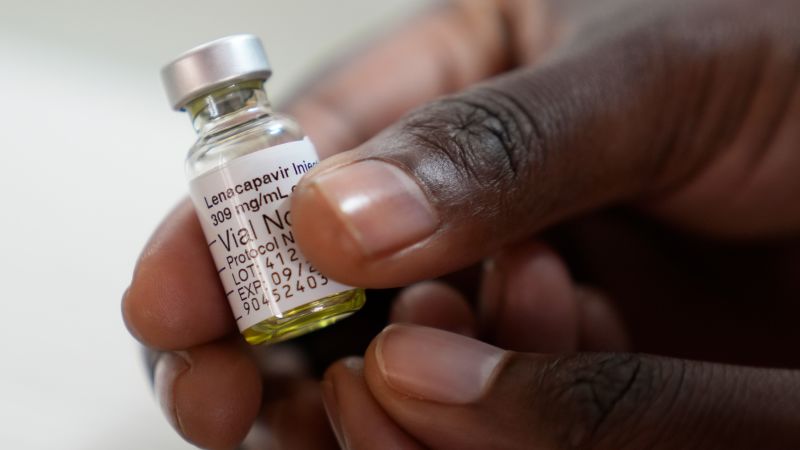The World Health Organization (WHO) recently made a significant recommendation urging countries to incorporate a newly approved drug, lenacapavir, into their strategies for preventing HIV infections. This guidance particularly targets at-risk groups and regions heavily burdened by HIV cases. The endorsement was announced during the International AIDS Conference, held in Kigali, Rwanda, a platform highlighting global health challenges. This momentous announcement follows the United States Food and Drug Administration (FDA)’s approval of lenacapavir as a biannual injection for HIV prevention, less than a month prior. Previously, lenacapavir received authorization in 2022 for treating specific types of HIV infections and has demonstrated remarkable efficacy in trials aimed at preventing the virus, significantly lowering the risk of infections.
In a news conference, Dr. Meg Doherty, director of the WHO’s Department of Global HIV, Hepatitis, and Sexually Transmitted Infections Programmes, emphasized the practicality of these recommendations. She stated that the WHO is collaborating with various nations and partners to facilitate the practical implementation of lenacapavir. The recommendations stress that this long-acting injectable should be presented as a complementary prevention option alongside existing methods for individuals at risk for HIV. Furthermore, the guidelines advocate for the incorporation of rapid diagnostic tests, including at-home testing, for individuals starting, continuing, or discontinuing long-acting preventive treatment, commonly known as pre-exposure prophylaxis (PrEP).
HIV transmission primarily occurs through unprotected sexual contact or needle sharing, leading to damage to the immune system, which, if untreated, can progress to acquired immunodeficiency syndrome (AIDS). According to the WHO, around 40 million individuals were living with HIV globally at the conclusion of 2023. While PrEP has been utilized effectively to prevent HIV infections for years through oral medications like Truvada in the United States, lenacapavir offers a novel alternative with its twice-yearly injection.
Lenacapavir, referred to as LEN, represents an innovative option in the HIV prevention arsenal, potentially appealing to individuals who prefer fewer healthcare appointments or struggle with daily oral medications. Dr. Doherty highlighted the drug’s ability to enhance adherence and accessibility, even for pregnant and breastfeeding women. The WHO has pledged to provide technical support to countries interested in integrating LEN into their HIV prevention programs, collaborating with numerous global partners such as the Global Fund and UNAIDS.
Despite this advancement, challenges loom over funding mechanisms essential for HIV prevention initiatives. International assistance contributes to a staggering 80% of HIV prevention efforts in low- and middle-income nations, as per United Nations reports. However, recent months have seen a substantial reduction in U.S. funding for global health, further complicating the implementation of these new recommendations. The previous U.S. administration’s dismantling of the U.S. Agency for International Development (USAID) and the constricted financial support for the President’s Emergency Plan for AIDS Relief (PEPFAR)—an unprecedented commitment towards a single disease—signify a troubling trend.
Gilead Sciences, the manufacturer of lenacapavir, announced its collaboration with the Global Fund to ensure the drug is supplied at no profit to the company. This agreement aims to make lenacapavir accessible to an estimated two million individuals in lower-income countries, thereby providing critical support until generic versions become available. Gilead, while keeping the specific costs confidential, has indicated that the annual list price for lenacapavir in the U.S. is approximately $28,218, aligning its pricing with other prevention medications.
Peter Sands, the executive director of the Global Fund, expressed optimism regarding lenacapavir’s potential impact on the future of the HIV epidemic, stating that the drug could substantially alter the disease’s trajectory. The ambition to administer long-acting PrEP to two million people hinges on the necessary global resources being mobilized. He emphasized the importance of ensuring that life-saving innovations transcend boundaries and reach those who need them the most.
In a stark warning, the United Nations posited that a decline in funding could result in millions more HIV-related deaths by 2029. The report indicated that within the 60 low- and middle-income countries reviewed, only 25 are planning to increase their domestic budgets for HIV responses in the coming year. However, this might not suffice to compensate for the international funding their programs have historically depended on.
UNAIDS raised alarms about potential drastic consequences should funding vanish, forecasting millions of additional deaths and new infections if support mechanisms are not restored. Reports from countries like Nigeria and Kenya illustrate the real-time effects of funding withdrawals, showing drastic drops in the provision of essential HIV prevention and treatment services. UNAIDS Executive Director Winnie Byanyima highlighted the dire consequences unfolding, emphasizing that this funding collapse is not merely a financial gap but a serious public health crisis.
Nonetheless, she remains hopeful, advocating for robust global solidarity to address these challenges as countries step up with domestic funding. The need for collaboration and commitment from the global community












